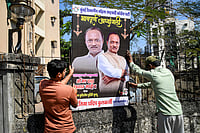As Kashmir secured a top rank for receiving the highest number of calls in the Tele Mental Health Programme, it also indicated the scale of mental health crises in the conflict-ridden Valley.
At the mental health day conclave in New Delhi early this week, Jammu and Kashmir was awarded for its work in the telemental health programme. The Health Secretary of J&K Dr Bhupinder Kumar said the centre has received 26,477 calls since the launch of the programme on November 4 last year.
The major reasons for calling included anxiety (2854 calls), sadness (2790 calls), palpitations (2428 calls), reduced interest (1931 calls), stress (1869 calls), sleep disturbances (1601 calls), suicidal ideation and attempt (799 calls), Dr Kumar said.
“All these calls were received by one centre which we have at the Institute of Mental Health and Neurosciences in Srinagar (IMHNS),” programme Manager of Mental Health NHM J&K, Dr Qazi Haroon said. “I think the helpline in the long term would also lessen the burden on hospitals, particularly on the IMHNS.”
The National Tele Mental Health Programme of India envisages working as a comprehensive, integrated and inclusive 24-hour tele-mental health facility in each state and Union Territory in India with the aim to provide mental health care through tele-mental health counselling services.
The Tele Mental Health Centre in Kashmir is located at the old building of the IMHNS, previously called the Psychiatric Disease Hospital, which is the epicentre of treating mental health disorders in Kashmir. Earlier known as the Psychiatric Disease Hospital, the IMHNS was a single-storey hospital in 1990 and less than 1000 patients visited the hospital in 1989. In 1990, the number of patients who visited the hospital increased to 1,762.
As political turmoil intensified in Kashmir, the number of people with mental illness visiting the hospital shot up to 62,000 patients in 2004. By 2017, the number went up to 1,06,743. Experts say that the number of people seeking mental health treatment is growing which is both a concern and an encouraging sign.
Waiting for their turn at the corridor of the Institute of the IMHANS on Thursday last week, were teenagers, old men and women with desperate and sad faces. “This is also the reflection of the spiking mental health trauma in Kashmir where conflict entered its fourth decade,” a 40-year-old woman from Srinagar said who was urging her teenage son to enter the hospital gate as he was reluctant to seek treatment for panic attacks.
“He thinks his friends will tease him that he is crazy. We are making him understand that he will be better after treatment. I forcefully brought him here,” the woman said with concern for her son, who is a Class 12 student.
A 2020 study titled “Mental health in Kashmir: conflict to COVID-19” observed that the Kashmir valley has been under political turmoil for decades which imposes an enduring psychological impact on the Kashmiri population.
There is a high prevalence of depression (41 per cent), anxiety (26 per cent), post-traumatic stress disorder (19 per cent), and 47 per cent had experienced some sort of trauma. It also said there is an immediate need for the development of mental health services in Kashmir accompanied by community participation, awareness programs, and mental health rehabilitation services.
The study highlighted the urgent need for researchers, clinicians, and policymakers to devise policies and interventions in the context of the prevailing mental health status of the Kashmiri population.
According to the National Mental Health Survey of India, 2015-16, a Kashmir mental health survey undertaken in ten districts of Kashmir valley in 2015 to estimate the prevalence of mental health–related conditions (depression, anxiety, post-traumatic stress disorder) and determine access to mental health services, the crises were severe.
The sample of the survey included 5600 adults above 18 years drawn from an equal number of households randomly selected from amongst 400 villages; children and adolescents were specifically excluded. The survey said the average lifetime traumatic events experienced by those in Kashmir was 7.7 and directly correlated it with the occurrence of mental health problems.
Another study of 2017 “Mental Health and Youth of Kashmir” written “in the context of political turmoil in Kashmir and the impact it had on the mental health of the Youth of Kashmir,” also found that on average, an adult in the Kashmir valley witnessed or experienced 7.7 traumatic events during their lifetime. Exposure to multiple traumatic events was positively associated with all three mental disorders - depression, anxiety, post-traumatic stress disorder. It, however, adds that the main coping strategies adopted by Kashmiri adults were praying, talking to family members or friends and keeping busy.
Although the study suggested keeping schools open as a good coping mechanism, it has been seen that for the past three years, schools and colleges have remained open, and yet, it has not quite placated the mental health crises in the Valley.
With the increasing mental health crises, the government has decided to introduce new initiatives to enhance mental health services across J&K. The government has expanded the number of seats for MD and DNB courses in psychiatry, introduced capacity building for both doctors and supportive staff, and diploma courses for medical officers with the support of NIMHANS Bengaluru.
The government also unveiled the country's first ChatBot for TeleMANAS, designed to improve access to mental health services. Officials say when accessing the ChatBot via WhatsApp, users will encounter a user-friendly interface providing information and assistance for various mental health issues. They say the ChatBot offers six predefined responses for common issues such as feelings of sadness, anxiety, sleep troubles, suicidal thoughts, physical intimacy issues, and addiction problems. They say in emergency cases involving suicidal thoughts, users will be promptly directed to consult a psychiatrist.


























